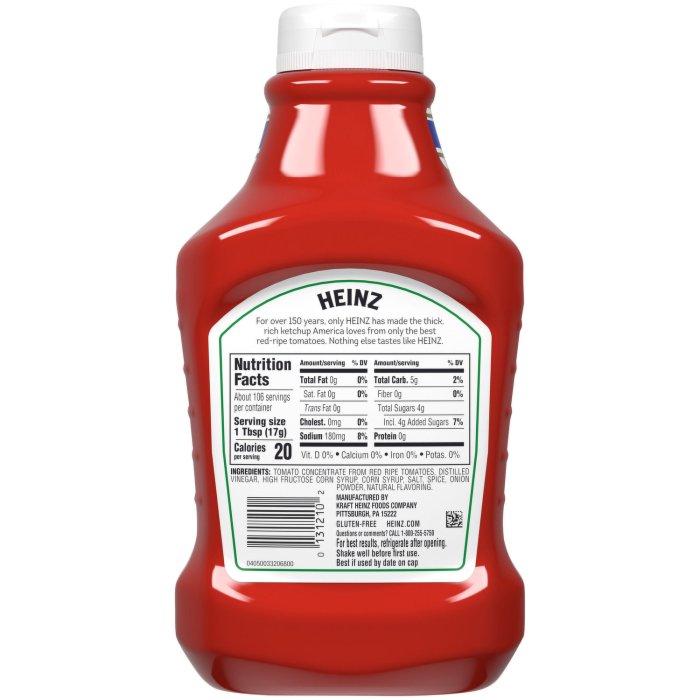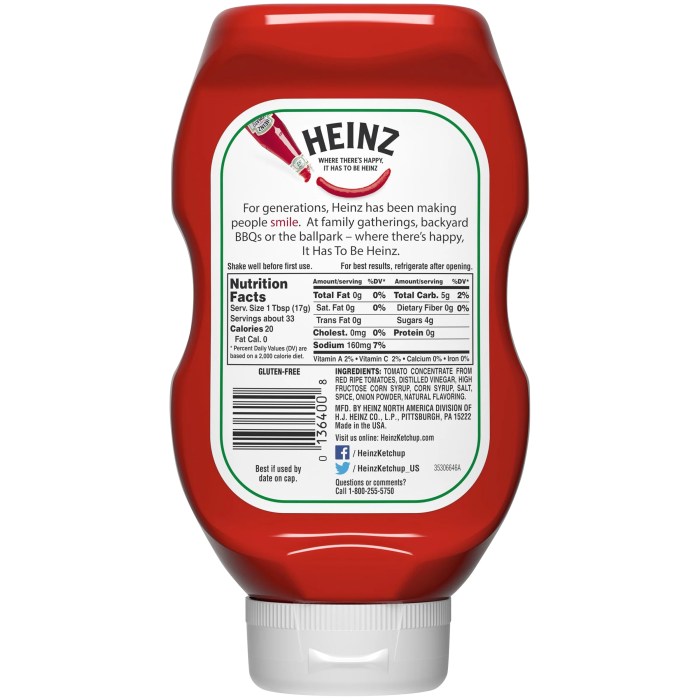Heinz Ketchup Ingredients & Macronutrient Breakdown

Nutrition facts of heinz ketchup – Heinz ketchup, a pantry staple for many, boasts a simple yet impactful ingredient list. Understanding its composition allows us to assess its nutritional value and how it fits into a balanced diet. Let’s delve into the specifics.
Ingredients of Heinz Ketchup
The primary ingredients of Heinz ketchup are typically tomatoes, sugar, vinegar, high fructose corn syrup, salt, onion powder, and spices. While the exact proportions vary slightly depending on the specific product formulation and region, these components consistently form the base. The “spices” category is often a blend of ingredients like garlic powder, allspice, and others, contributing to the ketchup’s characteristic flavor profile.
It’s important to note that the ingredient list can differ slightly between variations of Heinz ketchup, such as those marketed as “no sugar added” or “organic.” Always check the specific product label for the most accurate information.
Macronutrient Profile of Heinz Ketchup
The macronutrient content of Heinz ketchup provides valuable insight into its caloric contribution and impact on overall dietary intake. The following table displays a typical macronutrient breakdown per serving size (approximately 1 tablespoon or 15g), although this can vary slightly depending on the specific product.
| Nutrient | Amount per Serving (15g) |
|---|---|
| Calories | 15-20 |
| Total Fat | 0g |
| Saturated Fat | 0g |
| Cholesterol | 0mg |
| Sodium | 90-100mg |
| Total Carbohydrate | 4g |
| Dietary Fiber | 0g |
| Sugars | 4g |
| Protein | 0g |
Impact of Macronutrients in Heinz Ketchup
The macronutrient profile reveals that Heinz ketchup is primarily composed of carbohydrates, predominantly in the form of sugars. This contributes to its sweet taste but also means it’s a relatively high-sugar condiment. The lack of fat and protein makes it negligible in terms of these macronutrients’ contribution to a meal’s nutritional value. The sodium content is noteworthy; regular consumption of high-sodium foods can contribute to high blood pressure in some individuals.
Therefore, while Heinz ketchup can enhance the flavor of meals, it should be consumed in moderation, particularly for individuals watching their sugar and sodium intake. The absence of dietary fiber also means it offers little contribution to digestive health.
Micronutrients in Heinz Ketchup
Heinz ketchup, while primarily known for its tangy flavor, also contains a small amount of micronutrients. These are vitamins and minerals present in smaller quantities than macronutrients (carbohydrates, fats, and proteins) but still play vital roles in our body’s functions. It’s important to remember that ketchup is not a primary source of these nutrients, and a balanced diet remains crucial for optimal health.
A serving of Heinz ketchup (one tablespoon, approximately 15g) contains trace amounts of various vitamins and minerals. The exact quantities can vary slightly depending on the batch and sourcing of ingredients. However, generally, you’ll find small contributions of vitamins like vitamin K and vitamin A, as well as minerals such as potassium and iron. The amounts are typically expressed in milligrams (mg) or micrograms (mcg).
Micronutrient Content of Heinz Ketchup
While precise figures fluctuate slightly, a typical serving of Heinz ketchup provides a small amount of several micronutrients. It’s important to note that these quantities are generally low and shouldn’t be relied upon as a significant source of these vitamins and minerals in a daily diet. Consider the information below as a general overview.
- Vitamin K: A small amount, contributing to blood clotting and bone health.
- Vitamin A: A trace amount, important for vision and immune function.
- Potassium: A small contribution towards maintaining healthy blood pressure.
- Iron: A minor amount, crucial for red blood cell production and oxygen transport.
Comparison to Other Condiments
Comparing the micronutrient profile of Heinz ketchup to other common condiments reveals significant differences. Ketchup’s micronutrient content is generally lower than that of many other options. The following comparison highlights this disparity.
- Mustard: Often contains more vitamin K and potentially other micronutrients depending on the type and ingredients.
- Mayonnaise: Typically contains negligible amounts of vitamins and minerals, primarily consisting of fats and oils.
Health Implications of Micronutrients in Heinz Ketchup
The presence of micronutrients in Heinz ketchup, while minimal, does offer some potential health benefits, albeit negligible in the context of a balanced diet. The small amounts of vitamin K and potassium could contribute marginally to overall intake. However, it’s crucial to remember that relying on ketchup for these nutrients is not recommended. The high sugar and sodium content in ketchup far outweighs any potential benefits from its micronutrient profile.
Excessive consumption of ketchup can contribute to various health problems such as weight gain, high blood pressure, and increased risk of certain diseases. Therefore, moderation is key.
Heinz Ketchup and Dietary Considerations
Heinz ketchup, a pantry staple for many, presents a complex picture when viewed through the lens of various dietary restrictions. Understanding its ingredients and nutritional profile is crucial for making informed choices, especially for individuals following specific diets. This section will explore the suitability of Heinz ketchup for different dietary needs and compare it to other brands catering to specialized markets.
Heinz Ketchup and Vegan, Vegetarian Diets
Heinz ketchup is suitable for both vegan and vegetarian diets. Its ingredients primarily consist of tomatoes, sugar, vinegar, salt, and spices – all of which are plant-based. However, it’s always advisable to check the ingredient list on the specific bottle you purchase, as formulations can sometimes vary slightly by region or production run. Some brands might include minor additives not strictly plant-based, so vigilance is key.
Heinz Ketchup and Gluten-Free Diets
Heinz ketchup is naturally gluten-free. Gluten is a protein found in wheat, barley, and rye, and Heinz ketchup doesn’t contain any of these grains. This makes it a safe option for individuals with celiac disease or gluten sensitivity. Again, checking the label for any potential cross-contamination during processing is a good practice, especially if you have a severe gluten intolerance.
Heinz Ketchup and Low-Sodium Diets
Standard Heinz ketchup is not ideal for those on a strict low-sodium diet. Sodium is a significant component, contributing to the overall flavor profile. However, some brands offer low-sodium versions of ketchup, often reducing the sodium content considerably while maintaining a similar taste. Comparing the nutrition labels of regular Heinz ketchup with these low-sodium alternatives reveals a substantial difference in sodium content, allowing individuals to make a choice based on their dietary needs.
For example, a serving of regular Heinz ketchup might contain 150mg of sodium, whereas a low-sodium version might contain less than half that amount.
Comparison with Other Brands, Nutrition facts of heinz ketchup
Several brands offer ketchups tailored to specific dietary needs. For example, organic ketchups prioritize the use of organically grown tomatoes and avoid synthetic pesticides and fertilizers. These organic options often come at a premium price, but they cater to consumers seeking healthier, more sustainably produced products. Similarly, low-sugar ketchups reduce the added sugar content, making them a suitable choice for individuals managing their blood sugar levels or following low-carbohydrate diets.
A comparison of nutritional information between Heinz ketchup and these specialized brands reveals differences in sugar content, sodium levels, and the presence of organic ingredients. Direct comparison of labels is necessary for informed decision-making.
Potential Allergens in Heinz Ketchup
While Heinz ketchup is generally considered safe for most people, potential allergens need to be considered. The primary allergen to watch out for is tomatoes themselves. Tomato allergies, while not as common as other food allergies, can cause significant reactions in susceptible individuals. Additionally, while rare, cross-contamination during manufacturing with other allergens (such as nuts or soy) is a possibility.
Understanding the nutrition facts of Heinz ketchup, with its high sugar content, is crucial for mindful eating. For a comparative perspective on sodium and carbohydrate intake in a sandwich context, consider checking the nutritional information for common sandwich fillings; for instance, you might find the details on the jimmy john’s slim 1 nutrition facts page helpful. Returning to Heinz ketchup, remember to factor its nutritional profile into your overall daily caloric intake.
Therefore, always carefully examine the ingredient list and check for any allergen warnings. Individuals with severe allergies should exercise extreme caution and consult with their doctor or allergist before consuming Heinz ketchup or any other food product.
Serving Size and Consumption Recommendations

Heinz ketchup, that tangy, tomatoey condiment we all know and love, comes with a recommended serving size that’s crucial for managing our overall nutritional intake. Understanding this serving size and its associated nutritional values helps us enjoy ketchup responsibly as part of a balanced diet. Let’s delve into the specifics and explore ways to savor this classic condiment without overdoing it.One serving of Heinz ketchup is typically considered to be one tablespoon (approximately 15 grams).
This amount contains roughly 20 calories, less than 1 gram of fat, and about 4 grams of sugar. However, it’s important to remember that the exact nutritional content might vary slightly depending on the specific batch and any variations in the recipe. Always refer to the nutrition label on the bottle for the most accurate information.
Standard Serving Size and Nutritional Values
A single tablespoon (15g) serving of Heinz ketchup provides a relatively small amount of calories and fat, making it seem like a harmless addition to a meal. However, it’s the sodium and sugar content that deserves attention in relation to overall daily intake. While a single tablespoon might not significantly impact these levels, consistent and larger consumption throughout the day can quickly add up.
Remember to check the nutrition facts label for the specific values of sodium and sugar per serving.
Responsible Consumption Guidelines
To enjoy Heinz ketchup without compromising your health goals, mindful consumption is key. For example, instead of liberally dousing your fries with ketchup, consider using a smaller amount, perhaps half a tablespoon. Alternatively, try diluting the ketchup with a small amount of water or even mixing it with some mustard or other condiments to stretch its use and reduce the overall sodium and sugar intake per serving.
This approach helps maintain the flavor profile while significantly lowering the concentrated amount of sodium and sugar in each application. Many people find that the flavor isn’t significantly diminished even with a diluted application.
Alternative Uses for Heinz Ketchup
To reduce the amount of ketchup consumed per sitting and still enjoy its versatility, consider exploring these alternative uses:
Utilizing ketchup in smaller quantities or in creative ways can greatly reduce overall consumption per serving, while still adding a burst of flavor to your dishes. These alternatives allow for a more balanced approach to incorporating this condiment into your diet.
- Use a small amount as a marinade for grilled meats or chicken, adding depth of flavor without overwhelming the dish.
- Incorporate a teaspoon into sauces for pasta or stews to add a subtle tang.
- Use it as a base for a quick and easy glaze for roasted vegetables, adding sweetness and acidity.
- Mix it with a little brown sugar and Worcestershire sauce to create a unique dipping sauce for chicken wings.
- Add a splash to your chili or soup for a hint of umami and sweetness.
FAQ: Nutrition Facts Of Heinz Ketchup
Is Heinz ketchup vegan?
Yes, Heinz ketchup is generally considered vegan.
Does Heinz ketchup contain gluten?
No, Heinz ketchup is gluten-free.
Can I use Heinz ketchup on a low-sodium diet?
Use sparingly due to its sodium content. Consider low-sodium alternatives.
How much sugar is in a serving of Heinz ketchup?
Check the nutrition label for the exact amount; it varies by serving size.
Are there any artificial colors or preservatives in Heinz ketchup?
Check the ingredient list on the bottle. Formulations can change, so always check the current label.
